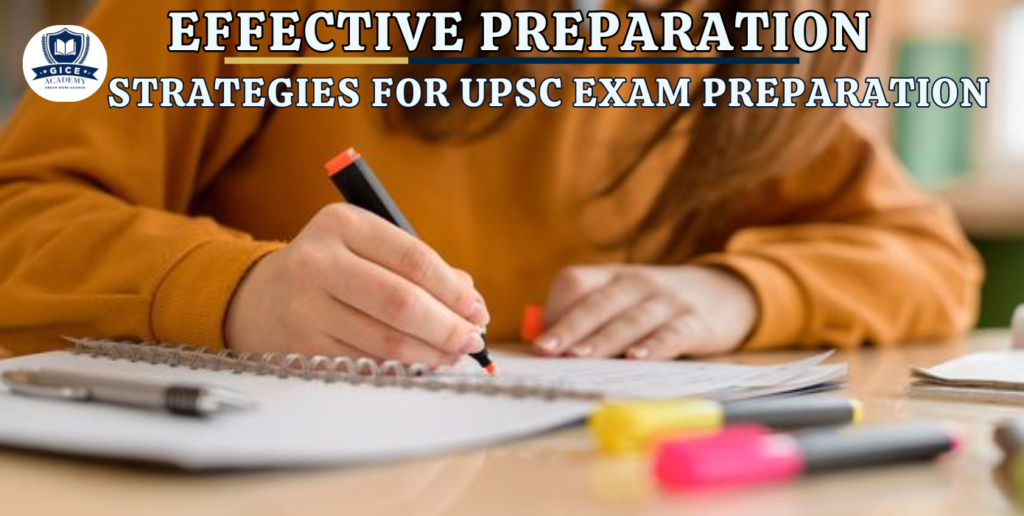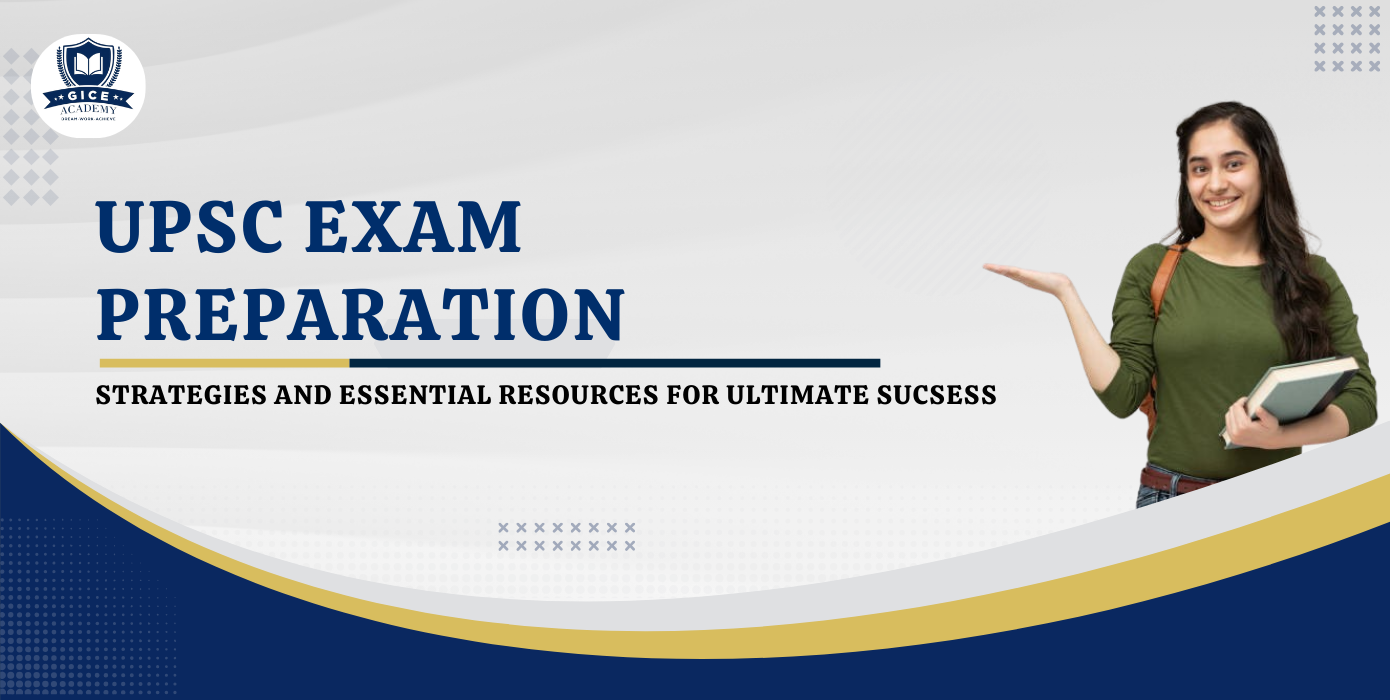Table of Contents
Introduction
The Union Public Service Commission (UPSC) is a critical gateway for aspirants aiming to serve in various prestigious government positions across India. The UPSC exams are renowned for their high standards and comprehensive subject coverage, presenting a significant challenge for candidates. This blog aims to provide a thorough guide to UPSC exam preparation, covering essential aspects such as eligibility, exam pattern, syllabus, preparation strategies, and resources. By following this guide, aspirants can streamline their study process and enhance their chances of success in UPSC exams.
Section 2: Understanding the UPSC Exam
The Union Public Service Commission (UPSC) conducts various exams to recruit candidates for different administrative positions in the Indian government. Some of the prominent exams conducted by UPSC include the Civil Services Examination (CSE), Indian Forest Service Examination (IFoS), Engineering Services Examination (ESE), and Combined Defence Services Examination (CDS), among others. Clearing these exams opens the door to prestigious and rewarding careers in the public sector, offering job security, attractive salaries, and the opportunity to serve the nation.
GICE Academy provides comprehensive training and study materials for competitive exams such as UPSC. They offer structured courses, experienced faculty, and an extensive range of study resources to ensure that candidates are well prepared for their exams.
Importance and Benefits of Clearing UPSC Exams by UPSC Exam Preparation:
- Career Advancement: UPSC exams provide a pathway to high-ranking government positions.
- Job Security: Government jobs offer stability and security.
- Prestige: Serving in administrative roles is highly respected.
- Attractive Salaries and Benefits: Competitive pay scales and additional perks.
- Community Service: Opportunity to contribute to public welfare and development.
For more details on exam dates, UPSC notifications, and the UPSC application form, visit the official UPSC website.
Section 3: Eligibility Criteria for UPSC Exams
Before applying for UPSC exams, it is crucial to understand the eligibility criteria, which include age limits, educational qualifications, and other specific requirements.
- Age Criteria: The minimum age requirement is typically 21 years.
- The upper age limit varies depending on the category:
- General category: 32 years
- OBC category: 35 years
- SC/ST category: 37 years
- The upper age limit varies depending on the category:
- Educational Qualifications: Candidates must possess a bachelor’s degree from a recognized university.
- Specific exams may require additional qualifications or specialized degrees.
- Other Specific Requirements: Physical standards for certain posts (e.g., Indian Forest Service).
- Nationality criteria as specified by UPSC.
Section 4: UPSC Exam Pattern for UPSC Exam Preparation
Understanding the exam pattern is crucial for effective preparation. The UPSC exams are conducted in three stages: Preliminary Exam, Main Exam, and Interview.
- Preliminary Exam: Objective-type questions
- Two papers: General Studies and CSAT (Civil Services Aptitude Test)
- Marks distribution: 200 marks each
- Main Exam: Descriptive-type questions
- Nine papers: Four General Studies papers, two Optional subject papers, one Essay paper, and two language papers (one English and one Indian)
- Marks distribution: variations for each paper
- Interview: Conducted to assess the candidate’s personality, communication skills, and suitability for the job
- Marks distribution: Typically 275 marks
Section 5: Detailed UPSC Syllabus for UPSC Exam Preparation
A thorough understanding of the syllabus is essential for targeted preparation. The syllabus for UPSC exams covers a wide range of subjects, including history, geography, politics, economy, science, and current affairs.
Prelims Syllabus:
- General Studies: History, Geography, Politics, Economy, Environment, and Current Affairs
- CSAT: Comprehension, Logical Reasoning, Analytical Ability, Decision Making, and Basic Numeracy
- Mains Syllabus:
- General Studies I-IV: History, Geography, Politics, Economy, Environment, and Science & Technology
- Essay Paper: Topics on social, economic, and political issues
- Optional Subject: Choose from a list of subjects like History, Geography, Public Administration, etc.
Recommended Books and Resources for UPSC Exam Preparation:
- NCERT books for basics
- Standard reference books like Laxmikanth for Politics and Spectrum for History
- Newspapers and magazines for UPSC current affairs
Section 6: Effective Preparation Strategies for UPSC Exam Preparation
Effective preparation strategies can significantly enhance your chances of success in UPSC exams.

- Time Management:
- Create a realistic study schedule
- Allocate specific time slots for each subject
- Take regular breaks to avoid burnout
- Study Schedule and Timetable:
- Divide the syllabus into manageable sections
- Prioritize subjects based on your strengths and weaknesses
- Stick to your timetable and adjust it as needed
- Understanding the Syllabus:
- Thoroughly read and comprehend the syllabus
- Identify key topics and focus on them
- Focusing on Current Affairs:
- Regularly read newspapers and follow news portals
- Make notes of important events and updates
- Revise UPSC current affairs frequently
Section 7: Tips and Tricks for UPSC Exam Preparation
In addition to a solid study plan, incorporating certain tips and tricks can further improve your preparation.
- How to Stay Motivated:
- Set short-term and long-term goals
- Reward yourself for achieving milestones
- Stay positive and remind yourself of your ultimate goal
- Revision Techniques:
- Regularly revise previously covered topics
- Use flashcards and mind maps for quick revision
- Practice writing answers to improve speed and accuracy
- Practice with Previous Years’ Question Papers:
- Solve past papers to understand the exam pattern
- Identify frequently asked questions and important topics
- Analyze your performance and work on weak areas
- Importance of Mock Tests:
- Take regular mock tests to simulate exam conditions
- Assess your preparation level and adjust your study plan accordingly
- Improve time management and accuracy
Section 8: Resources for UPSC Exam Preparation
Having the right resources is crucial for effective preparation.
Best Books for UPSC:
- Indian Polity by M. Laxmikanth
- History of Modern India by Bipan Chandra
- Geography of India by Majid Husain
Online Resources and Websites:
- UPSC official website for notifications and updates
- Online forums and study groups for discussions
- Educational websites offering free study materials
Coaching Classes: Pros and Cons
- Pros: Structured guidance, experienced faculty, peer interaction
- Cons: High cost, time-consuming, may not suit self-learners
Study Groups and Peer Discussions:
- Join study groups to share knowledge and resources
- Engage in peer discussions to clarify doubts and gain new insights
- For UPSC registration and more information, visit the official UPSC website.
Section 9: Common Mistakes to Avoid in UPSC Exam Preparation
Avoiding common mistakes can save valuable time and effort.
Not Following a Study Plan:
- Create a realistic and flexible study plan
- Stick to your plan and adjust it as needed
Ignoring Health and Well-being:
- Take care of your physical and mental health
- Include regular exercise and a balanced diet in your routine
- Ensure adequate sleep and relaxation
Over-reliance on Coaching Classes:
- Use coaching classes as a supplement, not a substitute for self-study
- Focus on self-study and practice
Neglecting Revision:
- Regularly revise all subjects
- Use effective revision techniques like flashcards and mind maps
Section 10: Success Stories and Case Studies
Learning from the experiences of successful candidates can provide valuable insights and inspiration.
Interviews with Successful Candidates regarding UPSC Exam Preparation:
- Discuss preparation strategies and tips from toppers
- Understand their approach to tackling different sections of the exam
Lessons Learned and Tips from Toppers regarding UPSC Exam Preparation:
- Consistent hard work and dedication are key
- Importance of self-study and regular revision
- Staying focused and motivated throughout the preparation journey
Preparing for UPSC and SSC exams requires a strategic approach, dedicated effort, and the right resources. By understanding the exam patterns of both UPSC and SSC, following structured study plans, and utilizing effective preparation strategies from GICE Academy, aspirants can significantly enhance their chances of success. Stay motivated, avoid common mistakes, and learn from the experiences of successful candidates to achieve your goal of clearing these competitive exams.
For those seeking expert guidance, consider enrolling in UPSC coaching classes in Thane offered by GICE Academy. These classes provide structured courses, experienced faculty, and extensive study materials to ensure thorough preparation for the exams.
To read more about effective exam preparation strategies, visit the next blog on GICE Academy’s website. Start your journey towards success today!
UPSC Exam Preparation: Final Tips to Crack UPSC
Aspiring candidates who aim to crack UPSC exams need to focus on consistent preparation, proper planning, and utilizing the right resources. Here are some final tips to help you succeed:
- UPSC Login Registration: Ensure you complete your UPSC login registration on time. Visit the official UPSC website and fill out the UPSC application form accurately. Keep your registration details handy for future reference.
- UPSC Interview Preparation: The UPSC interview is a crucial stage that assesses your personality, communication skills, and suitability for the job. Prepare thoroughly by practicing mock interviews and staying updated on UPSC current affairs. Confidence and clarity in your responses are key to performing well in the UPSC interview.
- UPSC Examination Strategy: Develop a clear strategy for each stage of the UPSC examination. Understand the pattern and syllabus for both the UPSC preliminary exam and the UPSC main exam. Allocate adequate time for revision and practice with previous years’ question papers.
- UPSC Prelims Exam Tips: For the UPSC prelims exam, focus on strengthening your fundamentals in subjects like General Studies and CSAT. Regularly revise important topics and stay updated on current UPSC events. Time management and accuracy are crucial in the preliminary stage.
- UPSC Mains Exam Preparation: The UPSC Mains exam is a comprehensive test that requires a deep understanding of various subjects. Utilize standard reference books, online resources, and study groups to cover the syllabus thoroughly. Practice writing descriptive answers to improve your writing skills for the main exam.
- Utilize Online UPSC Resources: Take advantage of online UPSC resources such as educational websites, online forums, and digital libraries. These platforms offer valuable study materials, mock tests, and peer discussions that can enhance your preparation.
- IAS Syllabus and Preparation: The IAS syllabus covers a wide range of topics. Ensure you have a thorough understanding of the syllabus and plan your studies accordingly. Consistent IAS preparation, with a focus on key areas, will help you excel in the exam.
- CSE Prelims Focus: For CSE prelims, concentrate on key subjects and practice multiple-choice questions. Regular revision and staying updated on UPSC current events will help you perform better in this stage.
FAQ
What is the minimum educational qualification for UPSC exams?
A bachelor’s degree from a recognized university is required.
What is the age limit for UPSC exams?
The minimum age is 21 years, and the upper age limit varies by category (e.g., 32 years for general, 37 years for SC/ST).
How many stages are there in the UPSC exam?
There are three stages: the preliminary exam, the main exam, and the interview.
What subjects are covered in the UPSC Prelims?
General Studies and CSAT.
Which books are recommended for UPSC preparation?
“Indian Polity” by M. Laxmikanth, “History of Modern India” by Bipan Chandra, and “Geography of India” by Majid Husain.
Are coaching classes necessary for UPSC preparation?
Not necessarily. They can provide guidance, but self-study is equally important.
How important are current affairs for UPSC exams?
Very important. Regularly reading newspapers and keeping up with current events is crucial.
What are the common mistakes to avoid during UPSC preparation?
Not following a study plan, ignoring health, over-relying on coaching, and neglecting revision.
How can I stay motivated during my preparation?
Set clear goals, reward yourself for milestones, and stay positive.
How can mock tests help in UPSC preparation?
They simulate exam conditions, help assess preparation levels, and improve time management and accuracy.


